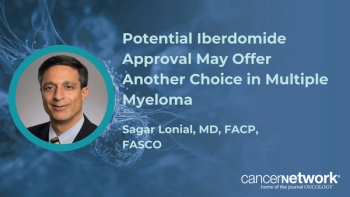
Oncology NEWS International
- Oncology NEWS International Vol 9 No 9
- Volume 9
- Issue 9
Irinotecan in Combination With 5-FU/LV Emerges as Frontline Chemotherapy for Stage IV Colorectal Cancer
PHILADELPHIA-“Most people would agree that standard-of-care for frontline treatment of advanced colorectal cancer (CRCA) should now be irinotecan (Camptosar) plus 5-fluorouracil/leucovorin (5-FU/LV),” stated Daniel G. Haller, MD, at an investigators’ workshop sponsored by the University of Texas M. D. Anderson Cancer Center and Pharmacia Oncology. As the basis for this assessment, Dr. Haller of the University of Pennsylvania Cancer Center in Philadelphia, cited presentations made earlier this year.
PHILADELPHIAMost people would agree that standard-of-care for frontline treatment of advanced colorectal cancer (CRCA) should now be irinotecan (Camptosar) plus 5-fluorouracil/leucovorin (5-FU/LV), stated Daniel G. Haller, MD, at an investigators workshop sponsored by the University of Texas M. D. Anderson Cancer Center and Pharmacia Oncology. As the basis for this assessment, Dr. Haller of the University of Pennsylvania Cancer Center in Philadelphia, cited presentations made earlier this year.
Dr. Haller raised the issue of what the proper endpoints for clinical trials in advanced colorectal cancer should be. Overall survival is still the one and only gold standard for new drug approval for CRCA. Many of us believe that there should be other markers for metastatic disease which might lead to drug approval, he said. Other criteria, he suggested, such as progression-free survival, response rate, or quality of life might be more appropriate for judging efficacy of some new drugs such as the cyclooxygenase-2 (COX-2) inhibitors.
As more drugs for colorectal cancer have become available, researchers have had to face the problem of crossover therapy complicating interpretation of the efficacy of initial regimens. One, two, or three new drugs, each adding 1 or 2 months of median survivorship, mean that the effect of first-line therapy can be impacted upon, Dr. Haller said.
Determining Optimal Use
Even after a drug has been approved, achieving optimal clinical use of the agent may take years of actual clinical experience. It took us a long time to determine how to best give 5-FU, Dr. Haller said. There is less overall toxicity from infusional protocols such as the de Gramont regimen, and these have been associated with significant improvements in response rate and in progression-free survival, he said. As Dr. Haller noted, however, data from meta-analyses have also shown that increased response rates do not necessarily translate into increased survival.
Two phase III studies of irinotecan combination regimens found response rates of 39% with irinotecan plus 5-FU/LV vs 21% with 5-FU/LV alone (P < .0001)in patients without prior chemotherapy. Both studies showed a significant survival advantage for the irinotecan combination vs standard 5-FU/LV, despite the high number of crossovers between the two regimens (see Figure).
Many patients in these trials eventually crossed over to receive irinotecan or other drugs. This suggests that even if you give drugs in sequence, you still maintain the overall survival advantage of the first regimen to which the patient was randomized, Dr. Haller noted. Although many trials of new agents start first with heavily pretreated or advanced-stage patients, a growing body of data in colorectal cancer shows that people who still look and feel well actually benefit the most from combination therapy, he added.
Potential New Agents
Turning to potential new agents for advanced colorectal cancer, Dr. Haller said that oxaliplatin has been on the horizon in the United States for quite a long time, but has produced attractive response rates in platinum-resistant cell lines. The pivotal de Gramont trial showed an increase in response rate and progression-free survival, but overall survival was not statistically significant.
With newer drugs such as oxaliplatin or irinotecan that may produce myelosuppression, adding a fluoropyrimidine regimen that has no significant myelosuppression has significant promise for the future, because there may be less overall toxicity, he continued.
Dr. Haller said that some of the data from oxaliplatin trials may have been confounded by the fact that there were patients who went on to potentially curative surgery. More patients who were previously thought to be unresectable are now going for surgical intervention when they are getting combination therapy, he said.
A related problem plaguing clinical trials is that patients randomized to the oxaliplatin arm in US trials, such as North Central Cancer Treatment Group (NCCTG) N9741, can still get irinotecan off trial as second-line therapy. This creates an unplanned crossover arm for some trials, Dr. Haller said, and complicates data interpretation.
Dr. Haller acknowledged that current thinking is that most patients with advanced colorectal cancer should get combination chemotherapy. We need drug selection factors, he concluded, to guide rational prospective selection of drugs for these patients.
Articles in this issue
over 25 years ago
Soy’s Effect on Breast Cancer Remains Uncertainover 25 years ago
STAR Enrollment Tops 6,000 in First Year of Recruitmentover 25 years ago
New rhTPO Being Tested in Three Trialsover 25 years ago
New Research Centers Target How Market Forces Affect Health Careover 25 years ago
PRIMATOM System Combines CT Scanning With Radiation TherapyNewsletter
Stay up to date on recent advances in the multidisciplinary approach to cancer.



















































